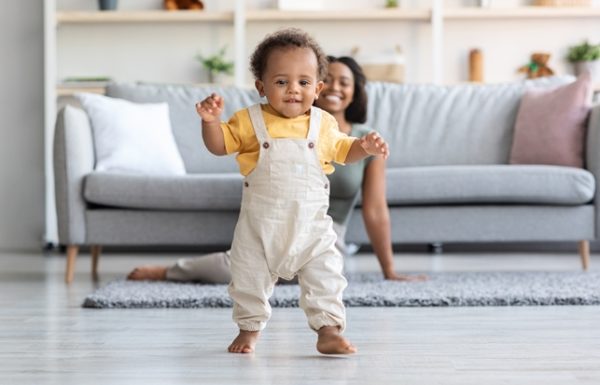
Seeing your little one take his or her first steps is so special, isn’t it? Definitely a picture-worthy moment!
It’s also a crucial developmental milestone for babies as they transition from being held or crawling slowly across the floor to walking.
However, learning to walk isn’t literally a walk in the park for babies. Most children start to walk at different times but a little push from parents can make them speed up!
Here are some ways you can help your child make the transition to walking and train him:
1. Start them early
Practice makes it all perfect. If you want to prep your baby to take their first steps, get them to try and stand upright and take tiny steps when they are around 7 months old. This helps build muscle memory and train the baby to stand up without support. Slowly, they’ll be able to make their first steps.
2. Keep them barefoot
You might be worried about the floor being dirty, but a lot of pediatrists recommend keeping babies barefoot in their early years. According to experts, staying barefoot helps little ones feel the surface, develop a certain posture which may not happen with shoes. This will help them stand up with little support, and eventually, walk.
3. Present some eye candy to keep them walking
Babies respond really well to visual aids and musical tunes. Keeping their favourite toys or snacks at a small distance from them can just sometimes work as a motivation for them to walk and grab stuff! A lot of studies also suggest that playing music, simple beats can also hone a baby’s motor skills and take their first steps!
4. Show them how to move
A little example never fails! While babies can’t pace up or walk at your speed, it will be really helpful if you show them the way to stand up straight or move steps ahead. Holding their arms and hands as they try and walk can motivate them.
You can also teach them how to squat, stand up or sit on a small stool using back support. This will help instil a balance in their bodies, needed to pace across the room. Siblings can play a big role here too!
As you do so, remember to use words of encouragement to keep them going!
5. Place them down!
As a parent, you can be used to holding up your baby for long, but as they grow, try and put them down and train them to instead, come up to you. Being constantly held, experts say can sometimes make a baby ‘lazy’ and slowdown their walking milestone. Let them try and use their feet naturally and standby for support.
6. Strengthen their limbs and muscles
The first step to actually taking the first steps is to strengthen the baby’s limbs, core and muscles, which would help them build a strong balanced needed to walk. While babies are too young to follow along exercises, try and hold them up from behind, or make them sit on a tiny exercise ball, training them to support or use their own back and most importantly, stay upright.
Baby massages can also help nourish their muscles and build a strong body.
What not to do
There are a lot of things parents and guardians can do to help a baby take his or her first steps. But its important to remember that the baby has to be absolutely ready for the transition. Remember, a baby will eventually make the first walk when he or she can, and forcing them won’t help.
Getting to learn a new thing can also be tiring. Make sure you give them time and take breaks yourself too. Do not seek the assistance of too many walking toys and ensure there’s plenty of space (babyproofed room) to move around.
Do not rush them
Lastly, do not cave into comparisons or parental pressures. Some babies start to walk around 8-9 months, while some can take as long as 15 months. Anywhere between the 9-18 month mark is considered normal for the age. The longer they do, just means their bones are taking time to shape up properly, that’s all. So do not rush them before they are really ready. Be there for them and cherish the moment before time flies by!




